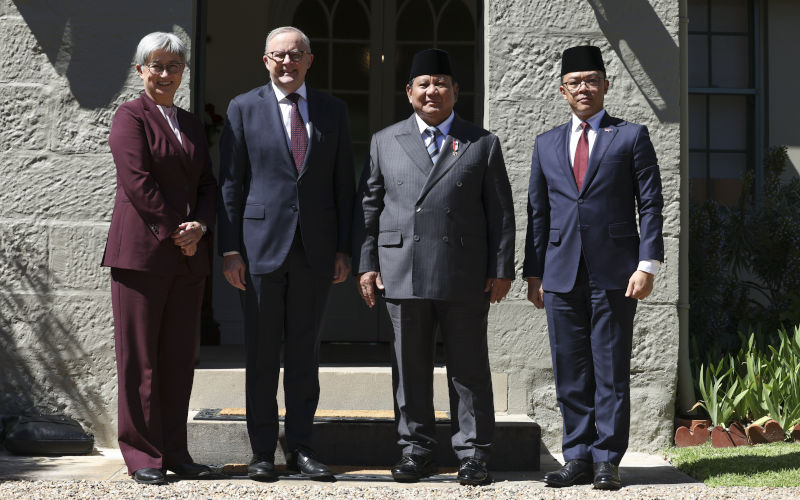Non-aligned and successful: Indonesia’s lesson for Australian foreign policy
November 27, 2025
Australia’s new security agreement with Indonesia comes at a critical moment. Jakarta’s non-aligned tradition offers lessons for a country still tied to a lopsided alliance with the US.
On 12 November, Australia and Indonesia announced a security agreement between the two governments. The agreement will be formally signed when the prime minister visits Jakarta early in the New Year.
It is not well understood in this country just how significant Indonesia is for Australia’s regional security. Despite a promising start to the relationship when Indonesia achieved independence from the Dutch in 1945, ties between Jakarta and Canberra since then have often been tense, largely because of Australia’s ham-fisted Asian diplomacy, although the Indonesians share some of the blame too.
Is the latest joint security agreement a signal that Australia is trying to balance its diplomacy with the Indonesians, while tracking towards a more independent course for itself in regional politics? Maybe. Foreign Minister Penny Wong recently claimed that the government has assumed the role of a “regional architect,” nurturing multi-lateral alliances across the South Pacific and Southeast Asia. The rhetoric is hopeful, but more hard work needs to be done to give substance to this foreign policy rhetoric. Indonesia has lessons to teach Australia on this score.
As a founding member of the Non-Aligned Movement (NAM) Indonesia carefully avoided making alliances with either of the two emergent superpowers, the Soviet Union and the USA. It maintained its independence in the context of post-War anti-colonial movements leading countries like India, Vietnam and Indonesia to successfully resist attempts by their former European colonisers to return to their former colonies, following the defeat of the Japanese at the end of the Pacific War.
NAM was formalised at a conference in Bandung in 1955. Its membership was made up of mainly newly independent countries from the Global South. Three leaders stood out at Bandung: Tito of Yugoslavia, Nehru of India, and Sukarno of Indonesia. NAM’s ideals are worth recalling.
From the outset, NAM was a movement that rejected allying with big states trying to impose an “international rules based order” which overwhelmingly benefitted those big states, but which was (and is) indifferent at best, often exploitive, and at worst hostile to states in the Global South. The history of the Cold War is replete with attempts by the superpowers to persuade, bully, or bludgeon NAM states into choosing between their spheres of influence – attempts that many NAM states bravely resisted. NAM also championed policies and agreements promoting post-colonial security and economic development. It became a voice for the Global South struggling to be heard by the superpowers and their hangers-on in the Global North, including Australia.
Yet the superpowers were loftily unmoved by NAM’s desire to be heard. They ridiculed the idea that non-alignment was a realistic policy and sought to undermine the movement, even sometimes colluding to undermine what the NAM states were advocating. While the superpower bullies were able to relegate NAM to the margins of global politics, the ideals of NAM have persisted. Indonesia remains steadfast in resisting the siren songs of the big power alliances.
Australia should learn from Indonesia as it struggles to sustain its lop-sided security dependence on the United States. Keeping all big powers at arm’s length is a worthy NAM principle, especially when big power allies become erratic and more selfishly-focused (isolationist), while upping the ante on what they expect from their dependent allies. This is precisely what America is doing to Australia right now as Washington plays a cat and mouse game over the ludicrous AUKUS deal.
It’s time for Australia to detach itself from its dependency alliance with the United States. Indonesia can show us that it is possible to live without such an alliance. Indeed, because Jakarta has successfully resisted a formal alliance with Washington, the Americans never take Indonesia for granted. They do take Australia for granted – and we are more the fool for allowing them to do so.
Moreover, Indonesia has shown that by keeping its distance from America and other big powers (including Russia) it can still maintain a mutually respectful working relationship with them. By contrast (in case we’ve all forgotten), when the Howard government took the lead in defending East Timor against the TNI, Washington sat on its hands despite Howard’s ineffectual pleading for it to become involved.
It needs to be clearly understood that the US alliance never has been the security guarantee that most Australians naively believe it to be. This country has contributed far more per capita to the alliance than the Americans ever have. Trump’s tariffs and his contempt for all alliances and allies while he panders to evil leaders like Putin and Netanyahu should make it obvious that the alliance is a one-sided affair, entirely in the US’ interests, not Australia’s. Nor is this likely to change after Trump departs the White House.
Australia should seek Indonesia’s advice about forging a non-aligned foreign and security policy. This doesn’t mean going it alone. Working closely with other states with similar non-aligned ambitions, Australia could free itself from the manacles of ANZUS, dispense with AUKUS, and find new allies with similar interests in combatting the bullying of big powers.
Australia could become a formal member of NAM and help revive its appeal to states that seek a better world than the one that the current crop of big power leaders want for themselves. Their legacy will be junked by emerging generations of better educated, morally astute young leaders who understand that problems like climate change, gobal inequality and war can only be solved by global cooperation. The present generation of aging, narcissistic leaders – Putin, Trump, Netanyahu, Erdoğan, Xi, Kim, Orbán, and now Takaichi – is incapable of imagining a better, peaceful world. There’s not a statesman or woman among them.
Australia can learn from Indonesia about the benefits of becoming a successfully non-aligned state, regionally and globally, while contributing to reviving the principles of an expanded and influential Non-Aligned Movement. Hopefully a new generation of young leaders will soon emerge to replace the present second rate lot (think Albanese, Ley, Marles, Taylor …) who are mismanaging this country so woefully.
The views expressed in this article may or may not reflect those of Pearls and Irritations.
Please support Pearls and Irritations with your tax deductible donation
This year, Pearls and Irritations has again proven that independent media has never been more essential.
The integrity of our media matters - please support Pearls and Irritations
For the next month you can make a tax deductible donation through the Australian Cultural Fund


